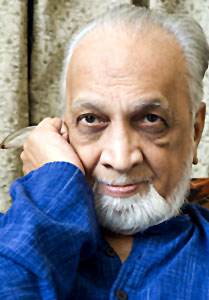 Vijay Tendulkar is a great dramatist and theatre person. He was born in Kolhapur in 1928. He took up journalism as a profession in 1948. He has written twenty-eight full-length plays and one novel, seven collections of one-act drama, six of children`s plays, four of short stories, and three of essays. Each of his major plays revolves around some contemporary idea, event, or issue that deeply affected him. He weaned Marathi theatre away from its habitual sentimentalism, overwriting, and narrow, drawing-room themes, and is a master of understated dialogue and fine irony.
Vijay Tendulkar is a great dramatist and theatre person. He was born in Kolhapur in 1928. He took up journalism as a profession in 1948. He has written twenty-eight full-length plays and one novel, seven collections of one-act drama, six of children`s plays, four of short stories, and three of essays. Each of his major plays revolves around some contemporary idea, event, or issue that deeply affected him. He weaned Marathi theatre away from its habitual sentimentalism, overwriting, and narrow, drawing-room themes, and is a master of understated dialogue and fine irony.
In his first successfully staged work, Shrimant i.e. `The Wealthy` in 1955, Tendulkar adhered to the form of the well-made drama, but departed from its conventional thematic concerns. He was introduced as a vagabond and later he became a union leader. He declared war against the dominant trend of the noble, idealized hero whose story was designed to draw easy tears and applause. His next play, Manus navache bet i.e. `An Island Called Man` in 1956 constituted a total rejection of the sentimental tradition. Its four protagonists belonged to that growing section of big-city educated unemployed youth, desperate for work and space, clinging on to respectability against impossible odds. Tendulkar`s ironic treatment of their travails struck some critics as a misplaced urge to evoke laughter when the karuna or pathetic rasa needed attention.
Shantata! Court chain ahe Jabbar Patel i.e. `Silence! The Court Is in Session` in 1967 was filmed by Satyadev Dubey in 1971. This was translated into many Indian languages. This also revealed through the device of a play within a play the latent human cruelty against the vulnerable. Gidhade i.e. `The Vultures` in 1970 showed man`s bestiality in its most savage shape. Driven by lust for money, a family turns into vultures, preying on and tearing each other apart. Sakbarnm Binder in 1972 showed that the eponymous anti-hero brings home destitute women to serve him in return for food, clothes, and shelter. This was a veritable bomb dropped on the most cherished of social institutions, marriage. In Ghashiram Kotwal, Tendulkar responded to the disturbing rise of the lumpen Shiv Sena party aided and abetted by the ruling Congress party. This later grew afraid of the monster it had created. A realistic treatment could not have demonstrated the universality of the problem. At that time for the first time he chose a historical event and a form and musical treatment inspired by folk theatre, to create an allegory.
Gidhade, Sakharam Binder, and Ghashiram Kotwal set off storms of protest. Their producers and directors fought battles against the censors, the law, and the public to ensure the required permissions for performance.
Kanyadan i.e. `Giving Away the Daughter` in 1983 brought criticism from Tendulkar`s own constituency i.e. the liberals. This is because in it a Brahman`s daughter chooses to marry a Dalit who beats her up regularly. Tendulkar`s other important plays include Chimnyancha ghar hota menacha i.e. `The Sparrows` Nest Was of Wax` in 1959, Mi jinkalo mi haralo i.e. `I Won, I Lost` in 1963, Kawlyanchi shala i.e. `School for Crows` in 1963, Dambadwipcha mukabla i.e. `Face-off on Hypocrisy Island` in 1969, Ashi pakhareyeti i.e. `That`s How Birds Arrive` in 1970, Pahije jatiche i.e. `Wanted from the Right Caste` in 1976, Mitrachi goshta i.e. `A Friend`s Story` in 1981, and Kamala in 1981.
Vijay Tendulkar also scripted the screenplays of eight Marathi and nine Hindi films for noted directors like Jabbar Patel, Shyam Benegal, and Govind Nihalani. Among the critically acclaimed ones are Patel`s Samna or `Confrontation` in 1975, Simhasan i.e. `Throne` in 1979, and Umbartha i.e. `Threshold` in 1981. Benegal`s Nishant or `Night`s End` in 1975 and Manthan i.e. `Churning` in 1976 are worth mentionable. Nihalani`s Akrosh i.e. `Cry of the Wounded` in 1980 and Ardh satya i.e. `Half-Truth` in 1983 were big hits. Amol palekar`s Akriet i.e. `Misbegotten` 1981wa also unforgottable.




